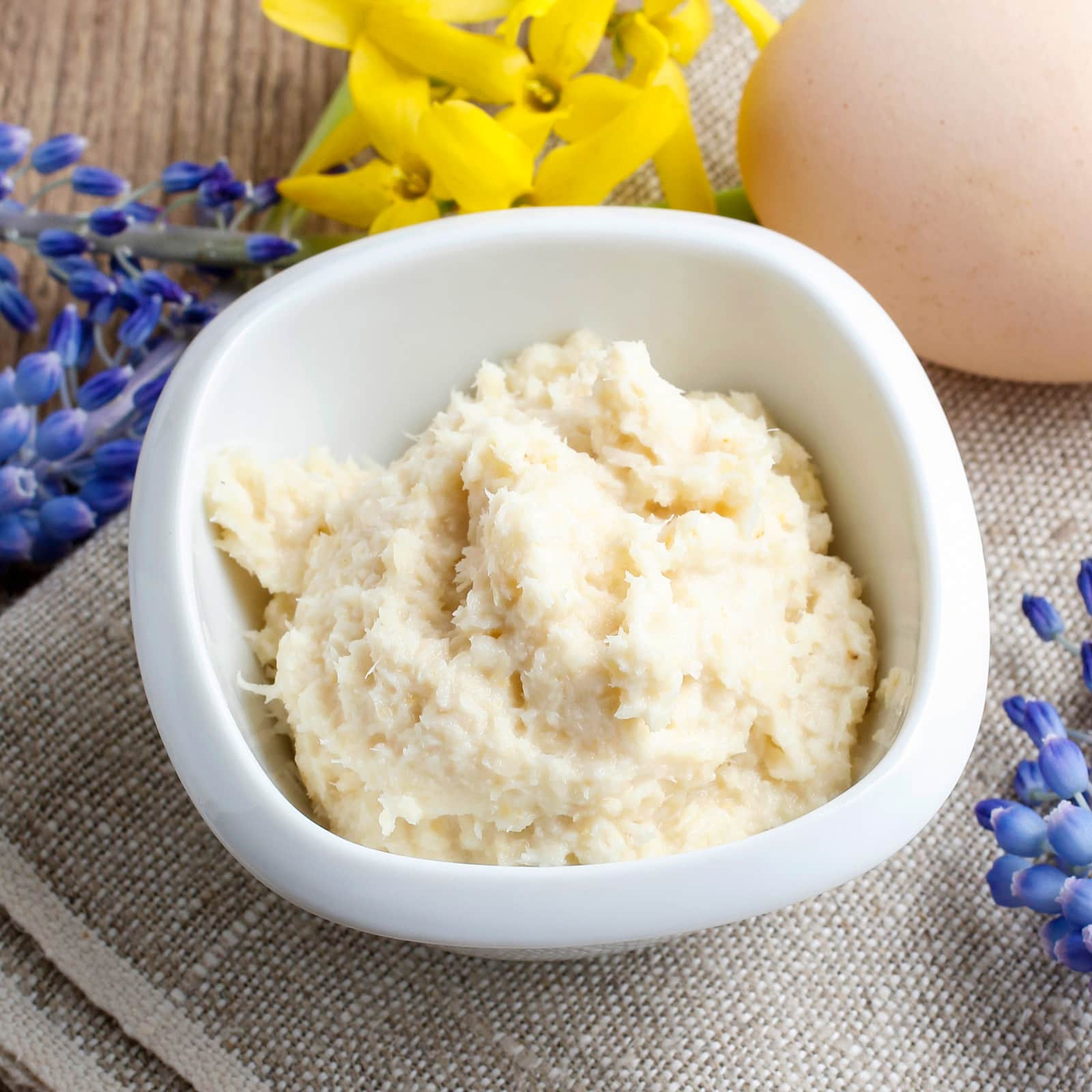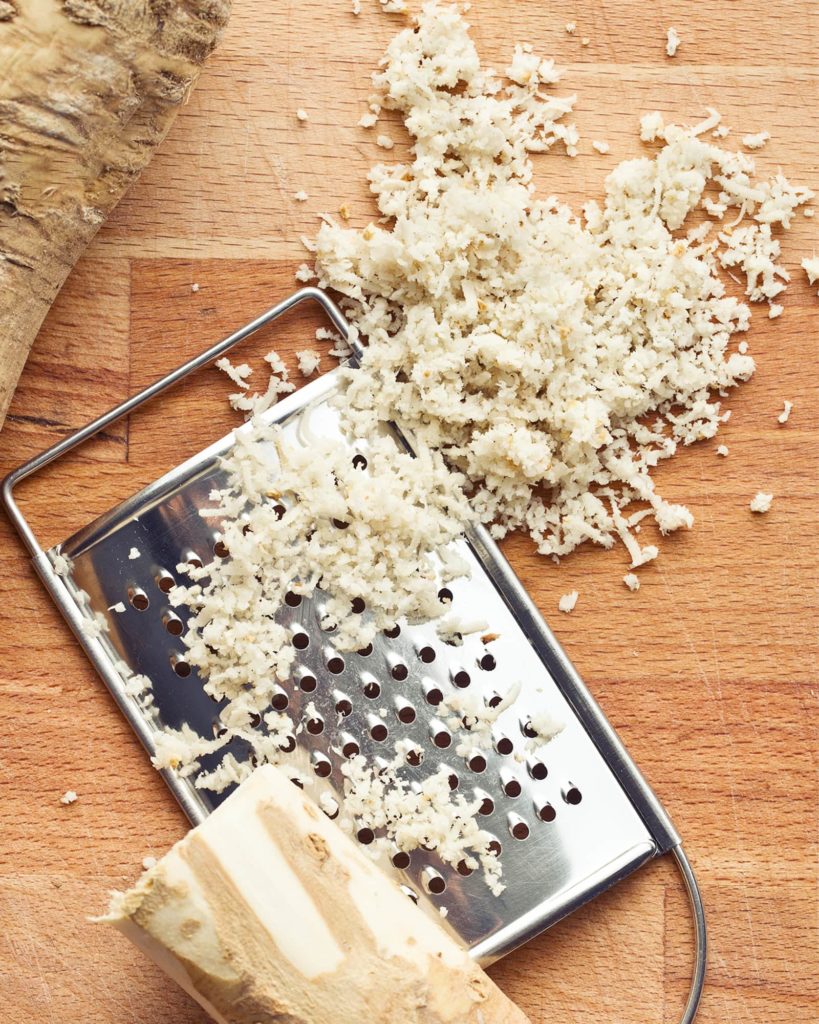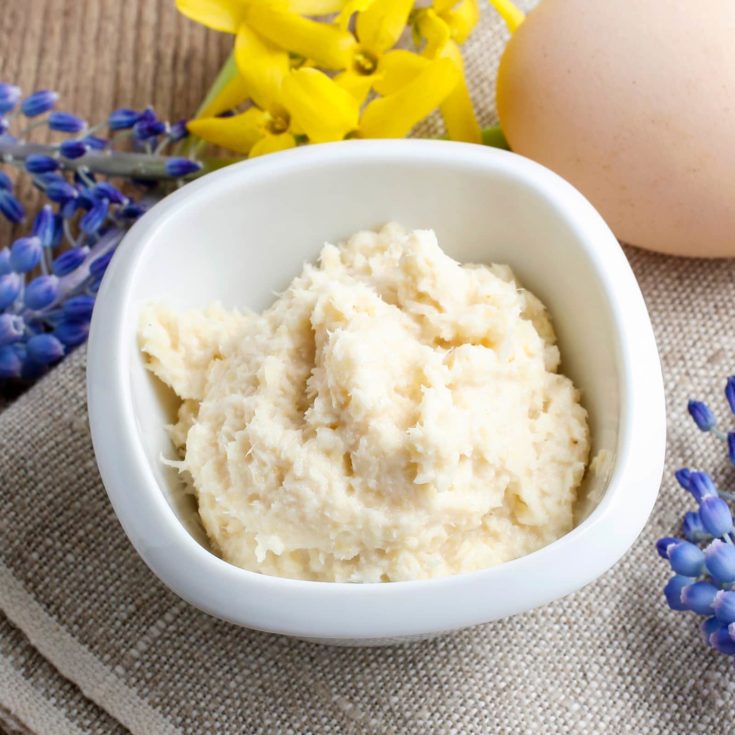Domowy Chrzan Tarty
Chrzan: Homemade Prepared Horseradish Condiment
How to pronounce it?
Hshaan
‘Play’ to hear:

Polish word ‘Chrzan’ translates to ‘horseradish’. But when used colloquially, we mean: Prepared Horseradish, a spicy condiment made of grated horseradish root.
To balance its pungent flavour, the grated root gets mixed with lemon juice (or vinegar), as well as a touch of sugar and salt.
For the full list of ingredients & detailed instructions, please see the recipe card at the end of this post. But before you scroll, there’s important stuff to know below.
If you don’t want to grate your own Chrzan at home, there are ready-made options available, most commonly sold in small jars.
Of course, nothing beats the homemade condiment, but sometimes convenience prevails – that’s why it’s worth reading the label before you buy.
Many of these mass-produced relishes contain less than 60% of horseradish (sic!), and the rest consists of unnecessary fillers, such as thickeners, fats, whey and artificial preservatives.
Do you need any special ingredients or equipment?
As long as you can find fresh horseradish roots – you’re golden. The rest of the ingredients are easily available in any major supermarket.
Horseradish root
The best (and practically free of charge!) source is your own garden. Horseradish doesn’t require much attention and is easy to reproduce from root pieces.
When shopping, pick the roots that are still fresh and firm. At home, if they’re getting a bit flabby, place them into ice-cold water for a few hours – it will firm them up.
Equipment-wise, you’ll need:
- box grater, food processor/blender or juicer/juicing press
- medium bowl
- small glass jar with a lid (10 oz, 300 ml)
What to serve it with?
This Prepared Horseradish condiment is extremely versatile. It’s most commonly served with heavier and fattier dishes, as it aids digestion and adds that extra ‘kick’.
Chrzan tastes best with:
- various kinds of kiełbasa, frankfurters, cold cuts and pâtés
- roasts, steaks, ribs, ham hocks
- fish dishes
It also acts as an ingredient in other dishes, for example in:
- Chrzanowa: Polish Horseradish Soup
- certain regional Żurek soup recipes
- creamy horseradish sauce
- Ćwikła (beet horseradish condiment)
- as an addition to potato purée, egg salads, egg-based breakfast spreads, potato salads, salad dressings
- as a relish in sandwiches and hot dogs
Can you prepare it another way?
Yes, you can.
The recipe below is the most basic, classic one. It’s very sharp, but that’s how it’s supposed to taste. Here’s how to change things up.
Grating method
Regardless of the method you choose, be prepared for a super-sharp, stinging smell. It’s best to grate either outside or next to a wide-open window.
The texture will depend on the tools you’ll use:
Box Grater / hand grater
This method takes the most time, effort and tears. But in return, you’ll get the fluffiest, finest horseradish flakes.

If you own a pair of air-tight googles (either ski, safety or onion googles), it’s worth wearing them for this task. You might look silly, but it’s worth it.
Juicer / Juicing Press
To be completely transparent – we’ve never tested this method. But anecdotally, this method is fast, easy and yields very similar results to the regular box grater.
Blender / Food processor
This method is equally fast and easy, but the end result differs. The horseradish won’t be as light and fluffy – there are no flakes, but just tiny little root pieces.
If your device comes with grating disks, choose the one with the smallest holes, in tandem with the regular blade. The finer you can grate the roots, the better.
As a general recommendation, it’s worth taking advantage of one of the electric kitchen appliances, even at the cost of imperfect texture. Grating by hand is too demanding and accident-provoking, but if you’re up for a challenge – go for it.
Additional ingredients
For a milder, more complex flavour, you can take your own spin, by adding one (or more) of the following:
- 2-3 tablespoons of thick sour cream, Soured Milk, or thick natural yoghurt
- 2 tablespoons of mayonnaise
- half of the finely grated apple
- 2 finely grated boiled eggs, with a touch of mayo
- 1 tablespoon of grated beetroot (cooked) – this will get you closer to Ćwikła realm
- 1 tablespoon of cranberry or aronia (chokeberry) preserve
Please note that these amounts apply to a small 10 oz (300 ml) portion – as per the recipe below. If you’re preparing a larger batch, you’ll need to increase the amount of these additional ingredients as well.
Substitutes
Lemon juice can be replaced with apple cider vinegar or wine vinegar.
Once you’re done – have a taste. If you feel like you need to add more acidity, add a little bit more. The same goes for sugar and salt, just season to taste.
What diets is it suitable for?
The basic recipe is vegan and gluten-free.
It’s also suitable for those who follow a dairy-free diet, but make sure to avoid any extra dairy products, mentioned in the suggestions above.
How long can you keep it in the fridge?
Once served, don’t keep it out at room temperature for more than 3-4 hours, especially if you have added cream and/or apple as well.
To store Prepared Horseradish, sterilise the jar with boiling water, move the horseradish over and screw down the lid. Store in the refrigerator for up to 4 weeks.
Can I freeze it?
Yes, you can – but it won’t be as flavourful after thawing. Canning is a better idea.
To freeze
Move the relish into a freezer-friendly bag or a container with a lid. Label it with a name and date and store it in the freezer for up to 6 months.
To use the horseradish again, leave it out at room temperature overnight and allow it to thaw fully.
To can
A better long-term storage solution is canning in jars. For more details on the exact process, check out Serious Eats ‘Beginner’s Guide to Canning’.

Recipe: step by step
Chrzan Tarty: Homemade Prepared Horseradish Condiment

This recipe makes a small 10 oz (300 ml) jar.
Ingredients
- 2-3 horseradish roots (approx. 0.7 lb, 10 oz, 300 g)
- 3 tablespoons lemon juice; can be replaced with apple cider vinegar or wine vinegar
- 3-5 tablespoons water; boiling
- 1 teaspoon sugar
- ½ teaspoon salt
Instructions
Regardless of the grating method you choose, be prepared for a sharp, stinging smell. It’s best to proceed either outside, next to a wide-open window, or wearing a pair of air-tight googles.
Prep work
- Rinse horseradish roots, clean off the dirt and peel with a sharp knife or a vegetable peeler.
Using box grater
- Grate the roots with the smallest holes of the grater. Move into a bowl, add 3 tablespoons of lemon juice and 3 tablespoons of boiling water. Stir well with a fork.
- Season with a teaspoon of sugar and half a teaspoon of salt, stir to combine.
Using juicer
- Cut horseradish into small-ish pieces. Push through the juicer, twice if you can. If your appliance separates grated horseradish from its juice, move them both into one bowl and combine.
- Add 3 tablespoons of lemon juice, 3 tablespoons of water, a teaspoon of sugar and half a teaspoon of salt. Stir to combine.
Using food processor/blender
- Cut horseradish into small-ish pieces. Drop them into your appliance and start grating/blending. To ease the process, gradually add 3 tablespoons of lemon juice and 3 tablespoons of water as you go.
- Season with a teaspoon of sugar and half a teaspoon of salt, combine well with a fork.
Final touches
- If you’re adding any extra ingredients (sour cream, mayonnaise, eggs etc.), now it’s a good moment to do so. (For tips, refer back to the main recipe post).
- Have a taste. Does it need more acidity? Add more lemon juice. More sweetness? Add more sugar. Is it too dry? An extra tablespoon of water will help.
- Sterilise a small (10 oz, 300 g) jar with boiling water, move the relish into it and screw down the lid. Chill in the fridge for at least 30 minutes before serving.
Nutrition Information:
Yield:
30Serving Size:
1Amount Per Serving: Calories: 5Total Fat: 0gSaturated Fat: 0gTrans Fat: 0gUnsaturated Fat: 0gCholesterol: 0mgSodium: 38mgCarbohydrates: 0gFiber: 0gSugar: 0gProtein: 0g
Polonist is reader-supported. When you buy through links on our site, we may earn a small affiliate commission. Learn more
Recipe Information
Filed under:
Alternative traditional/regional names:
krzan
Also known / Misspelt internationally as:
Tested by:
First published on:
Recipe by / Adapted from:
Story by:
Bibliography / References: